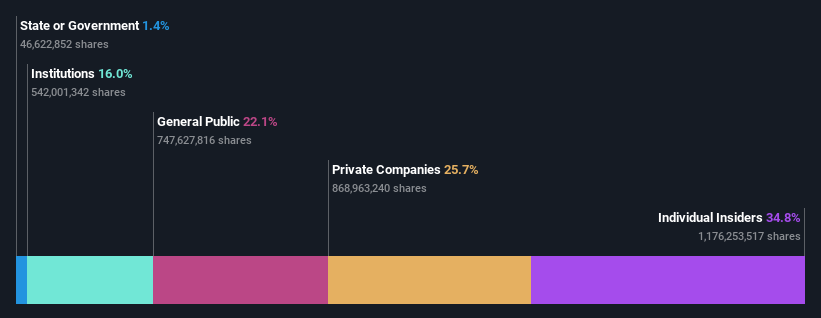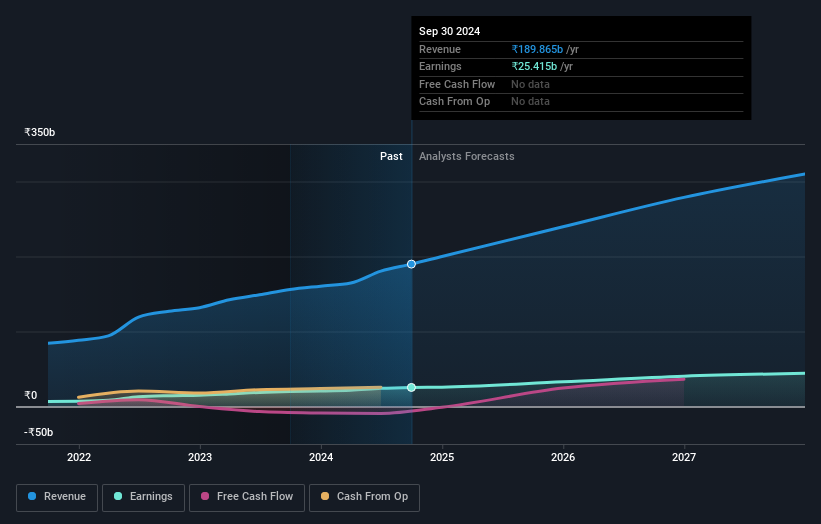The recent ₹74b market cap decrease is likely to have disappointed insiders invested in Varun Beverages Limited (NSE:VBL)

Key Insights
- Insiders appear to have a vested interest in Varun Beverages' growth, as seen by their sizeable ownership
- 58% of the business is held by the top 3 shareholders
- Institutions own 16% of Varun Beverages
To get a sense of who is truly in control of Varun Beverages Limited (NSE:VBL), it is important to understand the ownership structure of the business. We can see that individual insiders own the lion's share in the company with 35% ownership. Put another way, the group faces the maximum upside potential (or downside risk).
And last week, insiders endured the biggest losses as the stock fell by 3.8%.
In the chart below, we zoom in on the different ownership groups of Varun Beverages.
Check out our latest analysis for Varun Beverages

What Does The Institutional Ownership Tell Us About Varun Beverages?
Many institutions measure their performance against an index that approximates the local market. So they usually pay more attention to companies that are included in major indices.
We can see that Varun Beverages does have institutional investors; and they hold a good portion of the company's stock. This suggests some credibility amongst professional investors. But we can't rely on that fact alone since institutions make bad investments sometimes, just like everyone does. If multiple institutions change their view on a stock at the same time, you could see the share price drop fast. It's therefore worth looking at Varun Beverages' earnings history below. Of course, the future is what really matters.

Varun Beverages is not owned by hedge funds. Jaipuria Group is currently the company's largest shareholder with 26% of shares outstanding. In comparison, the second and third largest shareholders hold about 17% and 15% of the stock. Varun Ravi Jaipuria, who is the third-largest shareholder, also happens to hold the title of Vice Chairman.
After doing some more digging, we found that the top 3 shareholders collectively control more than half of the company's shares, implying that they have considerable power to influence the company's decisions.
Researching institutional ownership is a good way to gauge and filter a stock's expected performance. The same can be achieved by studying analyst sentiments. There are a reasonable number of analysts covering the stock, so it might be useful to find out their aggregate view on the future.
Insider Ownership Of Varun Beverages
The definition of company insiders can be subjective and does vary between jurisdictions. Our data reflects individual insiders, capturing board members at the very least. The company management answer to the board and the latter should represent the interests of shareholders. Notably, sometimes top-level managers are on the board themselves.
I generally consider insider ownership to be a good thing. However, on some occasions it makes it more difficult for other shareholders to hold the board accountable for decisions.
It seems insiders own a significant proportion of Varun Beverages Limited. It has a market capitalization of just ₹1.9t, and insiders have ₹650b worth of shares in their own names. That's quite significant. Most would be pleased to see the board is investing alongside them. You may wish to access this free chart showing recent trading by insiders.
General Public Ownership
The general public, who are usually individual investors, hold a 22% stake in Varun Beverages. While this size of ownership may not be enough to sway a policy decision in their favour, they can still make a collective impact on company policies.
Private Company Ownership
We can see that Private Companies own 26%, of the shares on issue. Private companies may be related parties. Sometimes insiders have an interest in a public company through a holding in a private company, rather than in their own capacity as an individual. While it's hard to draw any broad stroke conclusions, it is worth noting as an area for further research.
Next Steps:
I find it very interesting to look at who exactly owns a company. But to truly gain insight, we need to consider other information, too. Consider risks, for instance. Every company has them, and we've spotted 1 warning sign for Varun Beverages you should know about.
Ultimately the future is most important. You can access this free report on analyst forecasts for the company.
NB: Figures in this article are calculated using data from the last twelve months, which refer to the 12-month period ending on the last date of the month the financial statement is dated. This may not be consistent with full year annual report figures.
New: Manage All Your Stock Portfolios in One Place
We've created the ultimate portfolio companion for stock investors, and it's free.
• Connect an unlimited number of Portfolios and see your total in one currency
• Be alerted to new Warning Signs or Risks via email or mobile
• Track the Fair Value of your stocks
Have feedback on this article? Concerned about the content? Get in touch with us directly. Alternatively, email editorial-team (at) simplywallst.com.
This article by Simply Wall St is general in nature. We provide commentary based on historical data and analyst forecasts only using an unbiased methodology and our articles are not intended to be financial advice. It does not constitute a recommendation to buy or sell any stock, and does not take account of your objectives, or your financial situation. We aim to bring you long-term focused analysis driven by fundamental data. Note that our analysis may not factor in the latest price-sensitive company announcements or qualitative material. Simply Wall St has no position in any stocks mentioned.
About NSEI:VBL
Varun Beverages
Manufactures, bottles, sells, and distributes beverages and value-added products under the PepsiCo brands.
Flawless balance sheet with moderate growth potential.
Similar Companies
Market Insights
Community Narratives





